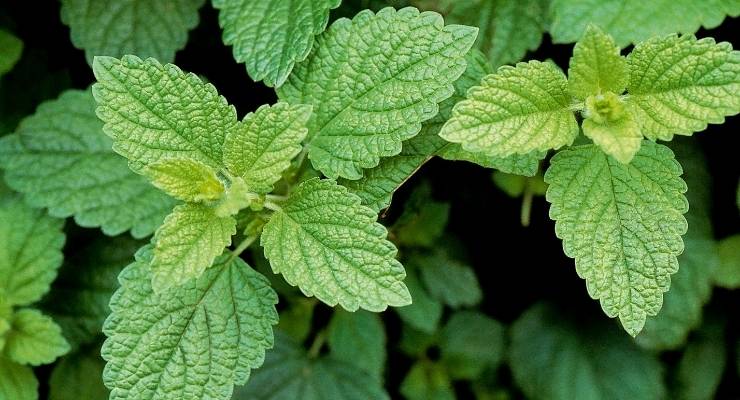10.05.22
The American Herbal Pharmacopoeia has released a monograph and therapeutic compendium for lemon balm (Melissa officinalis subsp. officinalis L.) leaf and aerial parts. This is the first in a series of publications for AHP’s planned Monographs Without Borders initiative and was a joint effort of AHP and researchers at Mashhad University of Medical Sciences, Mashhad, Iran, with special contributions by Dr. Mary Hardy of the Academy of Integrative Health & Medicine, San Diego, CA.
As with all AHP monographs, it was reviewed by a multidisciplinary team of experts in traditional herbal medicine, botany, chemistry, pharmacognosy, pharmacology, and lemon balm cultivation, specifically including experts in Iran where lemon balm is considered a very important herbal drug.
“Lemon balm is one of those underutilized and perhaps underappreciated botanicals. It has been used for relieving anxiety, digestive upset, nervous conditions, spasms, sleeplessness, headaches, among other uses, some of which have been forgotten or neglected, for several hundred years,” said Roy Upton, AHP president and monograph editor. “Among these uses, its effects on reliving nervousness, anxiety, and the many conditions that follow these two reigns supreme in the traditional literature. In modern investigations, its topical use for relieving herpes outbreaks is well-established in human clinical trials.”
Monographs Without Borders is meant to facilitate scientific cooperation with researchers in countries with which the U.S. might have otherwise challenging relationships in a non-political manner. Rather, it is meant to highlight plant medicines and their ancient trade routes and medical development, according to AHP.
The team of researchers from Mashhad University developed a review of lemon balm in 2017, and allowed AHP to build on what they began in an AHP-style monograph. The high-performance thin-layer chromatography (HPTLC) method was developed by CAMAG, Switzerland. The high-performance liquid chromatography (HPLC) method was developed by Dr. Anna Rita Billia of the University of Florence, Italy and was developed for the European Pharmacopoeia, which allowed AHP to use it to promote international harmonization between standards setting organizations. The chromatograms were generated by Alkemist Labs, a third-party testing company based in Garden Grove, CA.
The monograph and therapeutic compendium are available by ordering from AHP’s website.
As with all AHP monographs, it was reviewed by a multidisciplinary team of experts in traditional herbal medicine, botany, chemistry, pharmacognosy, pharmacology, and lemon balm cultivation, specifically including experts in Iran where lemon balm is considered a very important herbal drug.
“Lemon balm is one of those underutilized and perhaps underappreciated botanicals. It has been used for relieving anxiety, digestive upset, nervous conditions, spasms, sleeplessness, headaches, among other uses, some of which have been forgotten or neglected, for several hundred years,” said Roy Upton, AHP president and monograph editor. “Among these uses, its effects on reliving nervousness, anxiety, and the many conditions that follow these two reigns supreme in the traditional literature. In modern investigations, its topical use for relieving herpes outbreaks is well-established in human clinical trials.”
Monographs Without Borders is meant to facilitate scientific cooperation with researchers in countries with which the U.S. might have otherwise challenging relationships in a non-political manner. Rather, it is meant to highlight plant medicines and their ancient trade routes and medical development, according to AHP.
The team of researchers from Mashhad University developed a review of lemon balm in 2017, and allowed AHP to build on what they began in an AHP-style monograph. The high-performance thin-layer chromatography (HPTLC) method was developed by CAMAG, Switzerland. The high-performance liquid chromatography (HPLC) method was developed by Dr. Anna Rita Billia of the University of Florence, Italy and was developed for the European Pharmacopoeia, which allowed AHP to use it to promote international harmonization between standards setting organizations. The chromatograms were generated by Alkemist Labs, a third-party testing company based in Garden Grove, CA.
The monograph and therapeutic compendium are available by ordering from AHP’s website.




























